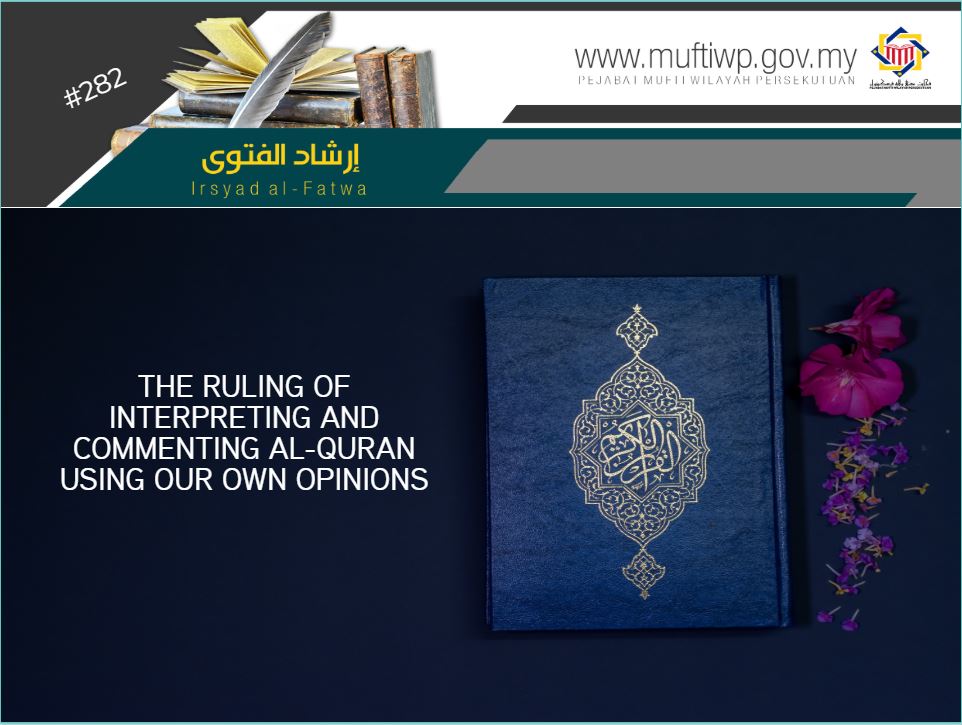Question:
Assalamualaikum Dato’ Mufti, what is the Islamic ruling for someone that interprets and comments on Quranic verses using his own opinions?
Answer:
Alhamdulillah, praise and thanks to Allah for the many countless blessings He has blessed us all with. Blessings and salutations to the Prophet Muhammad PBUH, his family, companions and all those that follow his teachings to the day of judgement.
In answering this issue, let us first explain the categories or types of commentaries used by mufassirin (commentaries scholars):
First: Al-Ma’tsur commentary
The meaning of tafsir bil ma’tsur is a commentary by the authorities of Al-Quran, Al-Sunnah and the opinions of the prophet’s companions.
Second: Commentary using independent reasoning or ijtihad (Al-Ra’yu)
For this type of commentary, the meaning of tafsir bil ra’yi is the commentary of the Quran using independent reasoning. The independent reasoning of commenting of the Quran is done by mufassir (individuals that are responsible for Al-Quran commentaries) after he has learned and mastered the Arabic language, terminologies and its wajh al-dilalah, knowing the asbab al-nuzul (circumstances of revelation), nasikh and mansukh and others.
We state here that this second category are further divided into two categories:
- Bil Ra’yi commentary that comes from qualified individuals
There are a few prerequisites for someone to be qualified to give commentaries on the Quran according to Islamic scholars. He must master the following; Arabic language, nahu and sorof, balaghah, qira’at, usuluddin, usul feqh, asbab- al-nuzul, nasikh and mansukh, the school of hadith and a few disciplines that are related to Quran.
In truth, the commentary of the Quran by independent reasoning or ra’yu is permitted since Allah SWT asked us to tadabbur the Quran. This is in accordance to Allah SWT’s statement in the Quran:
كِتابٌ أَنْزَلْناهُ إِلَيْكَ مُبارَكٌ لِيَدَّبَّرُوا آياتِهِ وَلِيَتَذَكَّرَ أُولُوا الْأَلْبابِ
“[This is] a blessed Book which We have revealed to you, [O Muhammad], that they might reflect upon its verses and that those of understanding would be reminded.”
Surah Sad (29)
Furthermore, even the prophet’s companions have differing opinions upon certain commentaries regarding the interpretation of Quranic verses. If ijtihad and nazhar (the study of) Quranic verses is prohibited, surely the companions has fallen into sin. But that is impossible since they are among the people that are guaranteed to get Allah’s pleasures and blessings.
- Bil Ra’yi commentary that comes from unqualified individuals
This category falls under the same ruling of saying things about Allah SWT without knowledge (القول على الله بغير علم). This is prohibited by the Quran through Allah’s statement:
إِنَّمَا يَأْمُرُكُم بِالسُّوءِ وَالْفَحْشَاءِ وَأَن تَقُولُوا عَلَى اللَّهِ مَا لَا تَعْلَمُونَ
“He only orders you to evil and immorality and to say about Allah what you do not know.”
Surah Al-Baqarah (169)
This is also supported by a hadith from Ibnu Abbas RA, the Prophet PBUH said:
وَمَنْ قَالَ فِي الْقُرْآنِ بِرَأْيِهِ فَلْيَتَبَوَّأْ مَقْعَدَهُ مِنَ النَّارِ
“Whoever said something about the Quran (without knowledge) using his own opinions, then prepare himself of his place in hellfire”
Sunan Al-Tarmizi (2951)
In Islam, when a punishment is already stated in the Quran about a certain act, then it is prohibited. A few narrations from the companions also states the prohibition of this act. Abu Hurairah RA said:
من فسر القرآن على رأيه فإن أصاب لم يؤجر وإن أخطأ مُحي النور من قلبه
“Whoever interprets and comments on the Quran using his own opinions, if his commentaries are right, he will be rewarded. However, if his commentaries are wrong, he will lose the light in his heart.”
The following are some instances of commenting on the Quran using his own opinions:
First: Claiming to be Allah’s messenger referring to a verse in the Quran:
إِنَّكَ لَمِنَ الْمُرْسَلِينَ
“Indeed you, are from among the messengers,”
Surah Yaasin (3)
And someone would define himself as the person indicated in the verse.
Second: Claiming to be Allah’s messenger for certain nations or people using Allah SWT’s words:
وَلَقَدْ بَعَثْنَا فِي كُلِّ أُمَّةٍ رَّسُولًا
“And We certainly sent into every nation a messenger,”
Surah Al-Nahl (36)
Someone would interpret this verse saying the he is a messenger for certain nations or people, for example he claims to be the messenger for Malay people.
Third: Claiming that prayer is sufficient by just reciting zikrullah (remembering Allah)
There are some claiming that worship in the form of prayer is sufficient if one just remembers Allah without the act of performing the prayer itself. They refer this opinion from the Quranic verse:
إِنَّنِي أَنَا اللَّهُ لَا إِلَٰهَ إِلَّا أَنَا فَاعْبُدْنِي وَأَقِمِ الصَّلَاةَ لِذِكْرِي
“Indeed, I am Allah. There is no deity except Me, so worship Me and establish prayer for My remembrance.”
Surah Taha (14)
Some people claim that this verse is proof in saying that praying is sufficient with just the remembrance of Allah. However, this is wrong, and this happen due to lack of knowledge. This is the perfect example of interpreting or commenting on Quranic verses using one own’s opinion that are prohibited in Islam.
Conclusion
As a conclusion, we would like to state that commentaries and interpretations by qualified individuals using Bil Ra’yi and ijtihad is permitted in Islam.
However, interpreting and commenting on the Quran when done by individuals with no knowledge or qualifications in the field is prohibited. This is as explained by the statements that are backed up by Quranic and hadith evidence above. Furthermore, to interpret or comment on the Quran one has to master the prerequisites set by Islamic scholars as stated before.
Let’s consider the wise words of Imam Ahmad to his peers:
إياك أَن تَتَكَلَّم فِي مَسْأَلَة لَيْسَ لَك فِيهَا إِمَام
“Be careful when speaking about something that you have no knowledge about”
As a result, when speaking referring to Quranic verses, it is better and safer to study and review the opinions of famous Islamic scholars in the school of Quranic commentaries, and related fields rather than elucidating our own opinions.
Lastly, may Allah give us the right understanding in practising our religion. Ameen.


